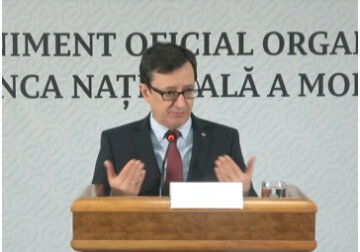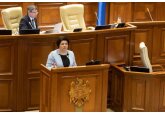
The NBM reduced the base rate applied to the main short-term monetary policy operations by 3 percentage points - from 20% to 17% per annum.
According to the President of the National Bank Octavian Armasu, this decision was made by the NBM Executive Committee at the meeting on February 7. In addition, also by 3 p.p. were reduced interest rates on loans and overnight deposits - from 22% to 19% and from 18% to 15% per annum, respectively. The head of the National Bank emphasized that the decision to reduce the base refinancing rate was taken to ensure the continuity of incentive measures in the context of the monetary policy easing cycle launched at the end of the previous year, against the backdrop of reasonable prerequisites associated with the creation of a disinflationary macroeconomic framework. “This decision is due to the confirmation of the correctness of the forecast of the National Bank of Moldova of October 2022 and the prospects for a slowdown in annual inflation under the influence of pronounced disinflationary pressure from domestic and external demand, as well as a neutral fiscal impulse, also confirmed for the current forecast,” said Octavian Armasu. As he mentioned, according to the current forecast, the annual inflation rate will decline rapidly during this year, returning to the target inflation range in the second quarter of 2024, where it will remain until the end of the forecast horizon. “The decision of the NBM to reduce the base rate is aimed at maintaining the balance of the national economy by creating monetary conditions for stimulating and accelerating domestic aggregate demand, as well as revitalizing consumption, activating in this sense the channels of the transmission mechanism, including lending,” stressed the President of the NBM. He noted that the fourth quarter of 2022 ended with a deepening of the global economic downturn. Global economic conditions and their prospects continue to be affected by the effects of the armed conflict in the region and the anti-inflationary behavior of central banks. From the point of view of containing world demand, there is a decrease in the annual growth rate of international quotations related to oil, food products and raw materials. As a result, global inflation is slowing down, but remaining well above pre-pandemic levels, leading some central banks to be reluctant to raise monetary policy rates, and restrictive decision makers to change interest rates marginally. Octavian Armasu explained that since the inflationary process in Moldova manifested itself earlier and with higher growth rates compared to other countries of the region, and the possibility of conducting a restrictive monetary policy led to its slowdown, our country joins the first group of countries in the world that change the nature of monetary policy to expansionist. The head of the National Bank stressed that the goal of the NBM is to contain inflationary expectations, restore and maintain inflation within the range of deviations of ±1.5 percentage points from the medium-term inflation target of 5%. He noted that annual inflation in Moldova is declining and amounted to 30.2% in December 2022 against 34.6% in October, which was the result of a decrease in the contribution to inflation from all its subcomponents. According to the NBM forecast, this year inflation will continue its rapid decline, reaching the upper limit of the variable inflation corridor at the end of December, after which its new acceleration will follow. Aggregate demand will generate disinflationary pressure in the current year and the first half of next year, and inflationary pressure in the second half of next year. The sharp decline in aggregate demand is based on the deterioration of external demand and sources of financing for household consumption. At the same time, a neutral fiscal stimulus will support negative aggregate demand in the first part of the forecast, and then, in the second half of next year, it will have a positive impact. Under these conditions, a stronger fiscal impulse is needed to stimulate economic activity in 2023. Herewith, among the factors that will influence inflation in the deceleration phase (Q1 2023 - Q2 2024), the NBM names: base from 2022, recent adjustments in electricity tariffs, continued easing of imported inflation in the coming year, and containment of oil prices in the international market. It is planned that the acceleration of the inflationary process in the second half of 2024 will be determined by the accumulated increase in energy prices in the international market, the adjustment of excises in early 2023 and 2024, the recent and expected adjustment of tariffs in the current year and related second-round effects, as well as an increase in sources of financing consumption. According to the current forecasts of the NBM, the average annual inflation will be 13.7% and 5.5% this and next year, respectively. According to the NBM, developments related to the military conflict in Ukraine and potential escalation retain the nature of risks and uncertainties regarding short-term and medium-term inflation forecasts. In this context, one should take into account the economic and geopolitical recession in the region, the deterioration of the global economic environment and the containment of world demand, import prices for energy resources and food products. Uncertainties arise in terms of agricultural production this and next year, as well as the timing and amount of tariff adjustments for regulated services. There are significant uncertainties about how the compensation will be reflected by the National Bureau of Statistics in the event of a potential change in the path of regulated prices. In addition, the risk associated with external financing causes an increase in excess liquidity in the banking system, which is reflected in aggregate demand and the dynamics of the national currency exchange rate, which may cause additional inflationary pressure. The NBM notes that it will continue to closely monitor the domestic and external macroeconomic situation, the risks and uncertainties associated with inflation dynamics in the short and medium term, and will intervene at the appropriate time by adjusting monetary policy instruments to achieve the fundamental goal of ensuring and maintaining stability prices. The next meeting of the NBM Executive Committee on monetary policy is scheduled for March. It should be noted that the last time the NBM reduced the base rate applied to the main short-term monetary policy operations was on December 5, 2022, reducing it by 1.5 p.p. - from 21.5% to 20% per annum. Prior to that, it had not decreased for 2 years, from November 6, 2020, when it was reduced from 2.75% to 2.65% per annum. Since then, until December 5, 2022, it has only increased, reaching a level of 21.5% in August 2022.// 07.02.2023 — InfoMarket







